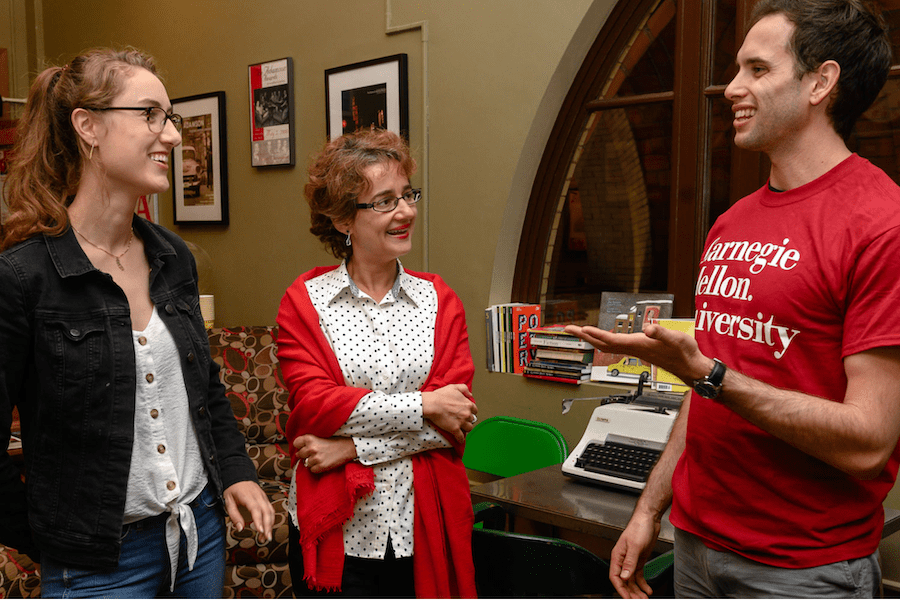
Ritivoi Reappointed Head of English Department
CMU professor continues in instrumental leadership role
Carnegie Mellon University has reappointed Andreea Deciu Ritivoi head of the Department of English. The department, which recently marked its 100th anniversary, offers programs in professional, technical and creative writing as well as rhetoric and literary and cultural studies.
"According to virtually all of her colleagues in English, and faculty and other heads across the college, Andreea has been an outstanding leader," said Richard Scheines, Bess Family Dean of CMU’s Dietrich College of Humanities and Social Sciences. "She is a top-notch scholar and excellent teacher, but she has also been an extraordinarily engaged and devoted head. I look to her for advice on the most difficult issues and for a humanistic perspective with depth. She has become, in a short time, a strong leader at the college and university level. We are truly lucky to have her on the faculty, and as a department head in English."
The English Department is among the founders of the field of technical communication, and its programs in professional writing, creative writing and rhetoric are among the oldest and most reputable of their kind in the country. CMU's graduate programs in literary and cultural studies are well known for theoretical depth and social and socio-political relevance.
Ritivoi has been instrumental in leading the university’s commitment to intellectual growth in the humanities through the creation of a minor in humanities analytics, a major in film and visual media, a major in literature and culture and a joint master’s degree program in global communication and applied translation (with the Department of Modern Languages).
During her first term as head, Ritivoi has led the revision of the English Department's curriculum in the writing and communication courses that educate students across the CMU campus. She also instilled a better support system for doctoral students, offering one of the best funding packages for these scholars in the country.
"It has been deeply rewarding to me personally to work closely with my colleagues in the English Department as well as in the college and in the university on developing new programs, suited for a new era in the Humanities and in English Studies," said Ritivoi. "My goal is to continue to enhance the reputation of the department, to make us even more competitive, as well as support our faculty and students to succeed as individual scholars."
The legacy of Ritivoi's tenure may best be exemplified by her leadership of the Humanities@CMU initiative, which was created to identify intellectual areas that present real opportunity for growth in education and research for the humanities. Through this initiative, Dietrich College aims to build stronger community within the humanities, as well as build strong bridges to local organizations in the communities that contribute to the cultural life of the city.
A native of Romania, Ritivoi joined Carnegie Mellon in 2001. Her research interests include rhetorical theory, narrative, globalization and migration, politics and controversy. She is the author of several books, including "Intimate Strangers: Hannah Arendt, Herbert Marcuse, Alexander Solzhenistyn, and Edward Said in American Political Discourse," an analysis of foreigner intellectuals' perspectives on American politics, and "Yesterday's Self: Nostalgia and the Immigrant Identity," where she explores the philosophical and historical dimensions of nostalgia in the lives of two immigrant writers.
She received the National Endowment for the Humanities 2015 research fellowship to investigate how the concept of "captive nations" emerged in early Cold War political discourse and made the "liberation" of other countries appear as an American responsibility.
"In these very challenging times, it is more important than ever we reflect on our deeper cultural values, on our social contract and on our responsibility to future generations," said Ritivoi. "These tall tasks require a humanistic expertise, whether in the form of communication skills or broad cultural analysis, that our department is uniquely positioned to offer. Navigating the waters of the next few years, as we recover from the pandemic crisis and continue to address directly societal challenges, won’t be easy. With the support of my colleagues, I welcome that challenge."